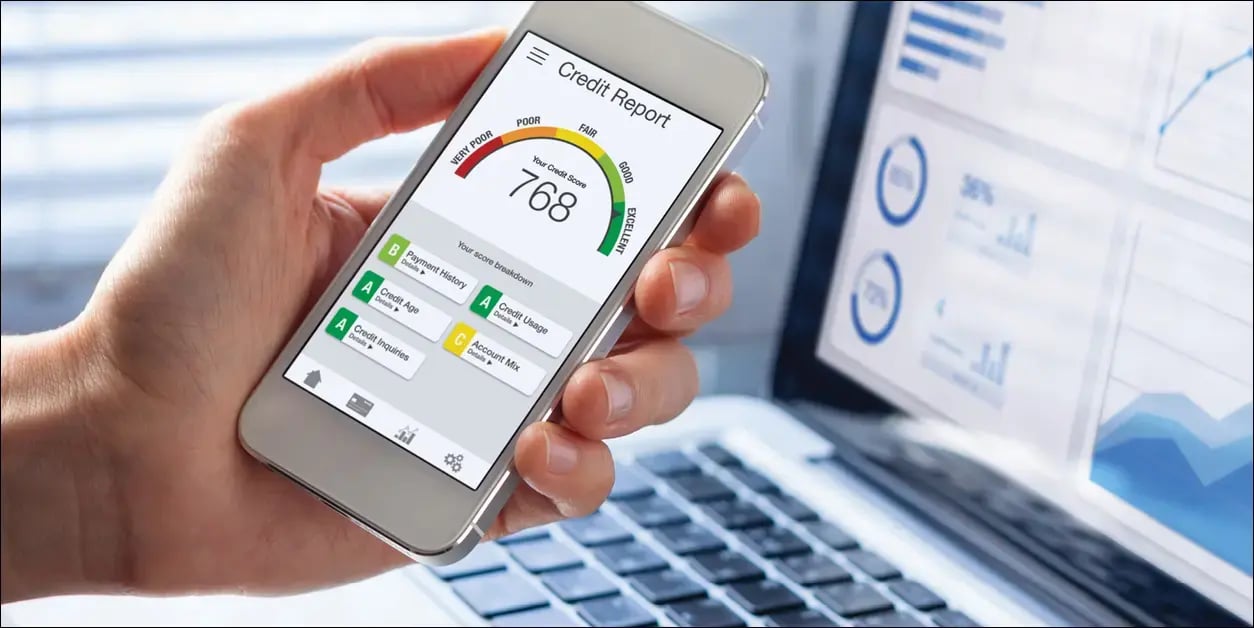
Why Your Credit Score Matters and How It Affects You
A high credit score opens up more financial opportunities, like qualifying for better loan rates, accessing credit options and having financial peace of mind. Today, we’ll go through the most effective ways to boost your credit score fast and build a solid foundation for long-term credit success.
1. What’s the Fastest Way to Boost Your Credit Score?
Payment History (192 Points - 35%)
Your payment history carries the most weight in your credit score. Making payments on time is crucial because:
- Late payments hurt your score for 48 months
- The impact is strongest in the first 24 months
- Negative marks stay on your report for 6 years
- Just one late payment can significantly damage your score
Credit Utilization (165 Points - 30%)
Credit utilization measures how much of your available credit you're using. For the best score:
- Keep utilization below 9%
- Never go above 30%
- Calculate utilization by dividing balances by credit limits
- Monitor both overall and per-card utilization
Length of Credit History (82.5 Points - 15%)
Three things matter for credit history length:
- Age of your oldest account
- Average age of all accounts
- How old your newest account is
Credit Mix (55 Points - 10%)
Different types of credit show you can handle various financial responsibilities:
- Credit cards (revolving credit)
- Car loans (installment loans)
- Mortgages
- Personal loans
New Credit (55 Points - 10%)
This factor looks at:
- Recent credit applications
- New account openings
- Hard inquiries on your credit report
2. Why Paying Down Credit Card Debt is Key to a Higher Credit Score
What is Credit Utilization and Why Is It Important?
Credit utilization is the percentage of your available credit that you’re using. For example, if you have three credit cards with a combined limit of $10,000 and your balance is $6,000, your utilization rate is 60%—which is too high.
What’s the Ideal Credit Utilization Percentage?
Ideally, keep your credit utilization below 10%, as higher percentages can negatively impact your score. Even bringing it under 30% can make a significant difference. This strategy works quickly, as credit utilization is recalculated each time your balance is reported to the credit bureaus.
How to Lower Your Credit Utilization Fast
- Pay down your balances as much as possible. Reducing your debt directly lowers utilization.
- Request a credit limit increase. By increasing your total available credit, your utilization rate goes down.
- Use multiple cards if necessary. Avoid maxing out one card by spreading out expenses.
3. Should You Pay for Credit Repair Services?
A common misconception is that credit repair is the solution for those with high credit card debt. Credit repair companies often offer to help improve your credit score by working on your report, but the truth is, paying down your debt is a more effective strategy.
When is Credit Repair Not the Answer?
If you’re carrying high credit card debt, it’s better to focus on paying down those balances rather than investing in credit repair. Use any money you would spend on credit repair services to reduce debt instead.
4. What is Payment History and Why is it So Important?
How Much Does Payment History Impact Your Score?
Payment history accounts for 35% of your credit score. This means on-time payments are the most crucial factor in maintaining a high score. Late payments, especially those 30 days or more overdue, can hurt your score for up to seven years.
How to Avoid Late Payments
- Set up automatic payments to avoid forgetting due dates.
- Add reminders to your calendar so you never miss a payment.
- Contact your lender if you miss a payment; some lenders may be able to help with removing late fees.

Debt freedom starts here
Lower rates, one easy payment. The smart way to manage debt.
-
- Slash your monthly payments
- Unlock lower interest rates
- Build credit with one on-time payment
5. How to Keep Credit Utilization Low for Maximum Score
Credit utilization makes up about 30% of your credit score. By focusing on maintaining low balances, you take control of a significant part of your score.
Why Paying Off Balances Before the Statement Date Helps
Paying off balances before the statement date ensures a low utilization rate when your credit card company reports it to the bureaus. If your statement closing date is the 20th, aim to pay by the 18th to achieve a lower utilization rate.
Tips for Managing Utilization Effectively
- Know your statement dates. Pay down balances at least two days before the closing date.
- Limit credit use after your statement closes. This prevents new balances from being reported.
- Stick to essentials if balances are high. Only use what you can pay off quickly.
6. Is It True You Should Carry a Balance on Your Credit Card?
The Truth About Carrying a Balance
It’s a myth that carrying a small balance each month will improve your score. Paying your balance in full each month is actually better, as it shows responsible credit use and avoids interest charges.

7. Does Opening New Accounts and Inquiries Affect Your Credit Score?
How Do New Credit Accounts Impact Your Score?
Opening a new account or applying for credit results in a hard inquiry, which can lower your score slightly. These inquiries stay on your report for two years, although they only affect your score for the first year.
How to Limit the Impact of New Accounts
- Avoid multiple applications in a short time. Space out applications by at least six months.
- Only apply for credit when needed. Limit inquiries to avoid score drops.
8. How Does Credit History Length Affect Your Credit Score?
Why Average Account Age is Important
The length of your credit history, which accounts for 15% of your score, includes both the age of your oldest account and the average age of all accounts. Closing an account can reduce your average account age, which may impact your score.
Why You Shouldn’t Close Old Accounts
If you don’t use an account, keep it open and make occasional small purchases to maintain a positive impact on your credit history.
9. Should You Dispute Errors on Your Credit Report?
Why Checking Your Report for Errors Can Boost Your Score
Credit report errors, like incorrect payment histories or duplicate accounts, can hurt your score. Review your report regularly and dispute any errors to keep your information accurate.
Steps for Disputing an Error
- Request a free report from each bureau (Experian, Equifax and TransUnion).
- File an online dispute with the credit bureau reporting the error.
10. How to Handle Collection Accounts on Your Credit Report
What to Do if You Have Accounts in Collections
Collection accounts can significantly damage your credit. If possible, negotiate with the agency to remove the account after settling it. This practice, called “pay-for-delete,” may not always work, but it can be worth a try.
How to Prevent Future Collection Accounts
Make timely payments and communicate with creditors if you anticipate trouble making a payment. Preventing collections is key to maintaining a high credit score.
11. Does Becoming an Authorized User Help Your Score?
What is an Authorized User and How Can It Help?
An authorized user is someone who is added to another person’s credit card account. This can be a quick way to increase your score by “inheriting” the account’s positive attributes, like on-time payments and low balances.
How to Safely Become an Authorized User
- Choose someone with a good history. A friend or family member with a good record can add you to their card.
- Avoid paying for authorized user status. Ask someone you know to avoid scams and ensure a positive impact.
12. Can Experian Boost and Rent Payment Services Increase Your Credit Score?
What is Experian Boost?
Experian Boost allows you to add positive payment history from utilities and streaming services to your credit report, which can help if you lack a long credit history.
Pros and Cons of Experian Boost
Experian Boost only affects your Experian score and won’t impact scores with Equifax or TransUnion. Still, it can be helpful if a lender checks your Experian report specifically.
13. What’s the Best Way to Use Credit Cards to Boost Your Score?
Should You Use Credit Cards for Daily Expenses?
Using your credit card for manageable, everyday expenses, like groceries or bills, can build credit without adding debt. Just be sure to pay off the balance in full each month.
Why Paying Your Credit Card in Full is Best
Carrying a balance is costly and it doesn’t improve your score. Paying off your balance every month is a better habit, avoiding interest while building a positive credit history.
14. How Does a Credit Mix Improve Your Score?
What is a Credit Mix and Why is It Beneficial?
A credit mix refers to different types of credit, like credit cards and loans. A balanced credit mix shows lenders that you can handle various types of debt and makes up about 10% of your credit score.
Should You Open Different Credit Accounts?
Opening new accounts just to improve your mix isn’t necessary. Instead, focus on managing existing accounts responsibly for the best score impact.
Conclusion: Start Improving Your Credit Score Today with Simple Steps
Improving your credit score requires understanding, strategy and patience. Remember:
- Focus on debt elimination first
- Understand and monitor statement dates
- Keep utilization under 9%
- Make all payments on time
- Be selective about new credit
- Build strong banking relationships
Success comes from consistent good habits and understanding how credit scoring works. With these strategies, you can take control of your credit score and build a strong financial future.
How to Get a Credit Score Above 700
Discover proven strategies to boost your credit score above 700. Our expert guide provides actionable tips to improve your creditworthiness and unlock better financial opportunities.
Frequently Asked Questions
What’s the Fastest Way to Boost My Score?
Paying down credit card balances and reducing utilization are two of the fastest ways to increase your credit score. Becoming an authorized user on a trusted account can also help.
How Often Should I Check My Credit Report?
Check your credit report at least once a year to catch and dispute any errors that could hurt your score.


